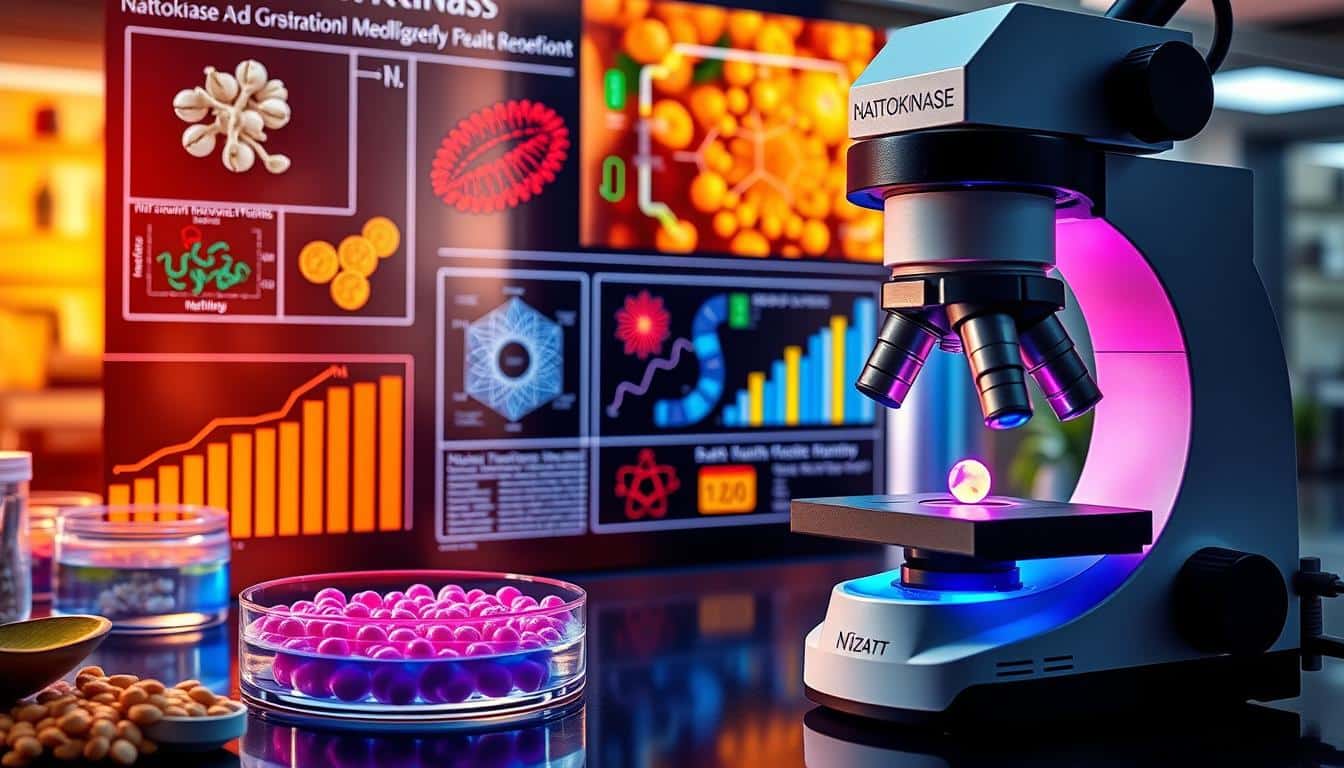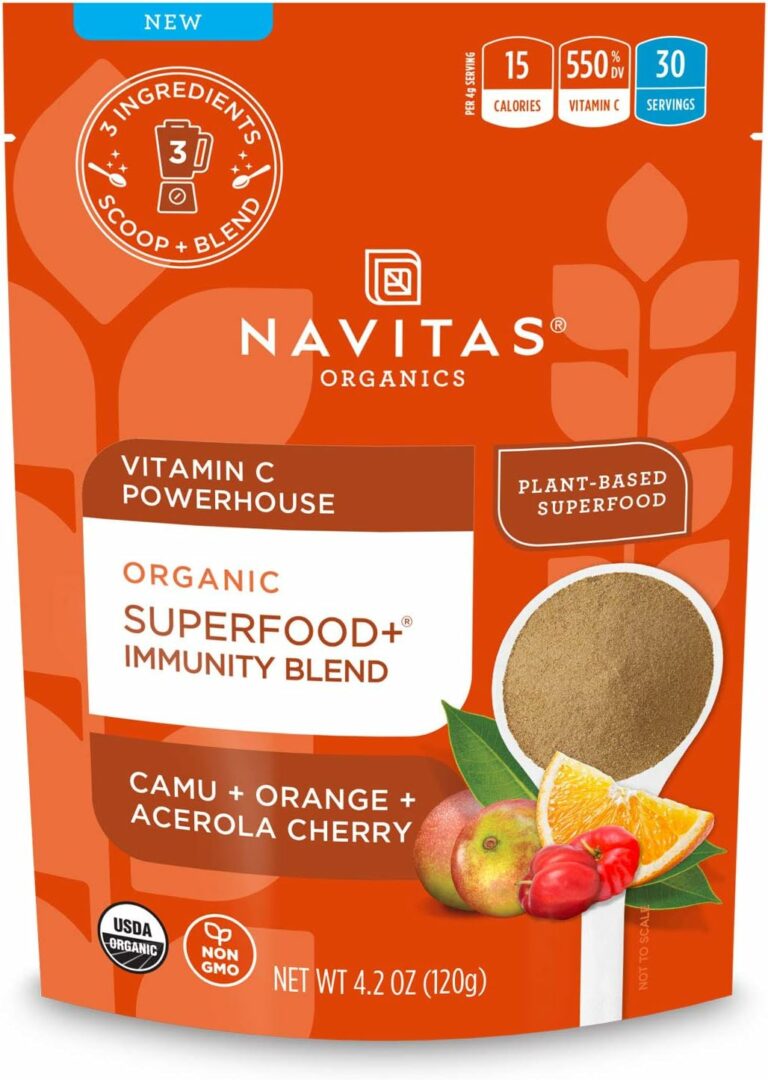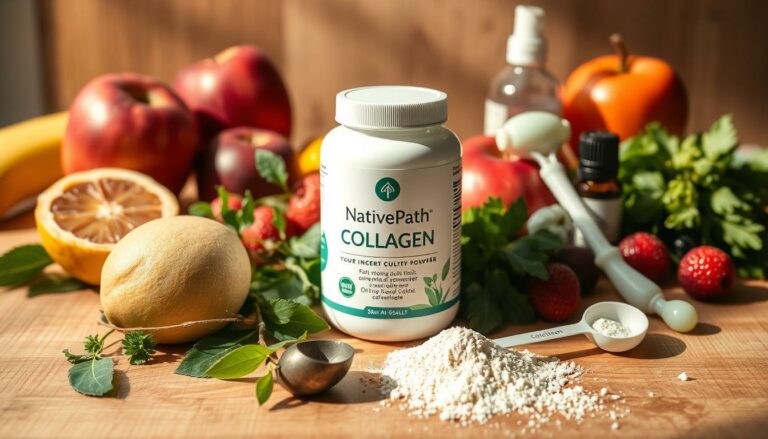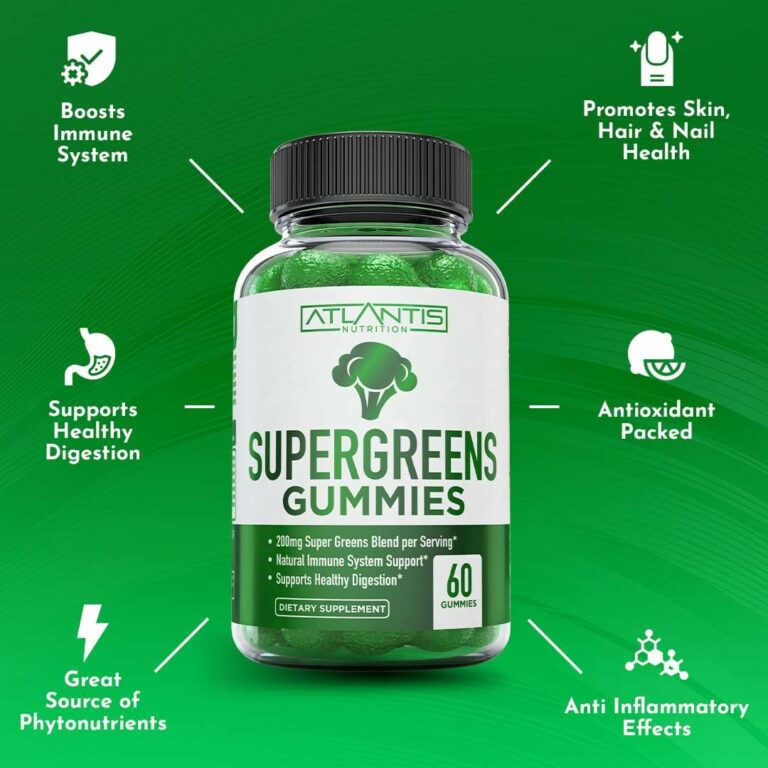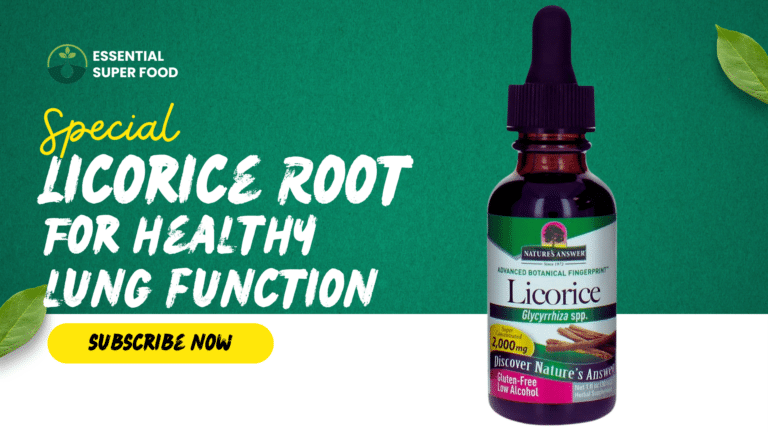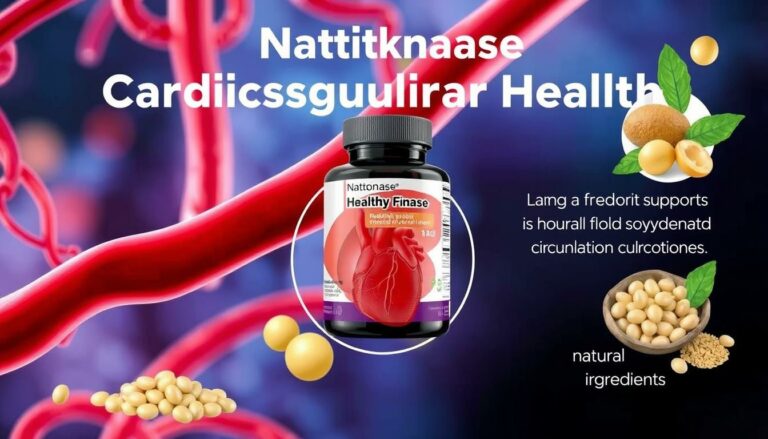Latest Findings in Nattokinase Research Studies
Did you know 98% of customers recommend Life Extension supplements? According to the latest findings in Nattokinase research studies, this shows people are looking for natural health options. Nattokinase is one of them, and research is showing it’s good for the heart.
Nattokinase comes from fermented soybeans. It’s getting attention for heart health. Studies show it helps with blood pressure and preventing clots. This is changing how we think about natural heart health.
Nattokinase research is growing fast. New studies are published quickly. This means we’re learning more about its benefits for the heart.
Studies are looking into how nattokinase helps with high blood pressure and blood clots. It seems to help the heart work better. This could lead to new health solutions.
Key Takeaways
- Nattokinase shows promise in supporting cardiovascular health
- Recent studies focus on blood pressure regulation and clot prevention
- Rapid publication of research is accelerating new findings
- Nattokinase may have applications in various cardiovascular conditions
- Ongoing research is uncovering new benefits of this enzyme
What is Nattokinase and Its Importance?
Nattokinase is a strong enzyme from natto, a Japanese food. It’s made from fermented soybeans. This enzyme is known for its heart health benefits.
It helps break down blood clots and improves blood flow.
Definition of Nattokinase
Nattokinase is made when soybeans are fermented with bacteria. This makes a special enzyme. Studies show it may help the heart and prevent blood clots.
Historical Context of Nattokinase Research
Nattokinase was first found in Japan, where natto is common. In the 1980s, scientists found it breaks down blood clots well. Now, it’s being looked at for medical uses.
Today, it’s studied for its heart health benefits. It may help with blood pressure and blood flow. It could also prevent deep vein thrombosis.
More research shows nattokinase’s value in health care. Its natural source and benefits make it interesting for heart health.
The Health Benefits of Nattokinase
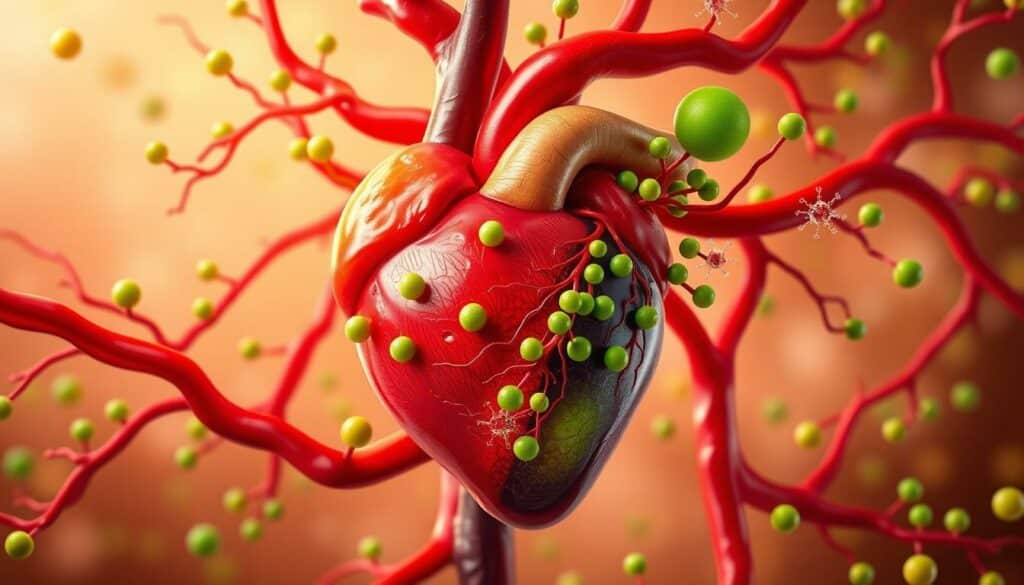
Nattokinase is an enzyme from fermented soybeans. It’s good for your heart and blood flow. Scientists are studying it for heart health.
Cardiovascular Health
Nattokinase is great for your heart. It keeps blood flowing well. It also lowers the chance of blood clots and heart disease.
Blood Pressure Regulation
Nattokinase might help control blood pressure. It makes blood vessels less stiff. This is good for people with high blood pressure.
Fibrinolytic Activity
Nattokinase breaks down fibrin, a clotting protein. This keeps blood flowing well. It also lowers the risk of dangerous clots.
| Benefit | Description |
|---|---|
| Cardiovascular Support | Promotes healthy blood circulation and reduces clot risk |
| Blood Pressure Management | May help lower and regulate blood pressure |
| Fibrinolytic Action | Breaks down fibrin to prevent excessive clotting |
Before taking nattokinase, talk to a doctor. It’s good for your heart. But, it’s important to be careful, too.
Recent Nattokinase Research Studies Overview

Nattokinase research studies have grown a lot in recent years. They show how this enzyme might help our health. Scientists are looking at how it affects our heart health through different studies.
Summary of Key Studies
Many studies have looked at nattokinase’s effect on blood pressure and clotting. A big study with people aged 20 to 65 showed good results. Those eating fermented foods lost weight, but the group without them gained.
Another important study found that eating 60 milligrams of kimchi powder daily for three months helped. It involved 90 people and showed weight loss and more good gut bacteria.
Comparative Analysis of Findings
Looking at different studies, a clear pattern appears. People eating fermented foods did better with weight and gut health. For example, those eating kimchi lost more weight than others.
- Fermented product consumption led to weight loss
- Placebo groups often showed weight gain
- Increased abundance of beneficial gut bacteria observed
- Short-chain fatty acids may play a role in appetite regulation
These studies suggest nattokinase and fermented foods could be very helpful. More research is needed, but the early signs are promising for heart health and weight control.
Mechanisms of Action in Nattokinase
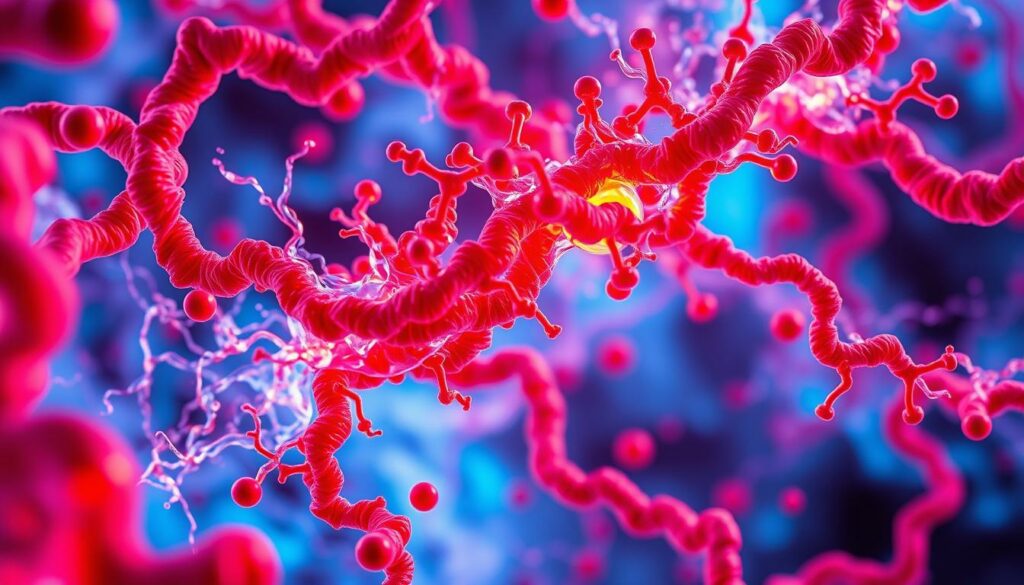
Nattokinase is an enzyme from fermented soybeans. It’s good for your heart. It helps prevent and dissolve blood clots.
How Nattokinase Works in the Body
Nattokinase helps your heart in many ways. It works on your body’s clotting system. This improves blood flow and lowers clot risk.
- Activates pro-urokinase, a precursor to a key clot-dissolving enzyme
- Boosts production of plasmin, an enzyme that breaks down fibrin
- Supports the body’s natural clot prevention processes
Role of Nattokinase in Fibrinolysis
Nattokinase’s fibrinolytic activity is key to its health benefits. It breaks down fibrin, a clot-forming protein.
| Fibrinolytic Action | Effect |
|---|---|
| Direct fibrin breakdown | Dissolves existing clots |
| Plasminogen activation | Enhances natural clot-busting |
| Inhibition of PAI-1 | Prevents new clot formation |
Studies show nattokinase is four times more potent than plasmin. This makes it great for your heart. It may lower thrombosis risk and improve blood flow.
Nattokinase for Thrombosis Prevention
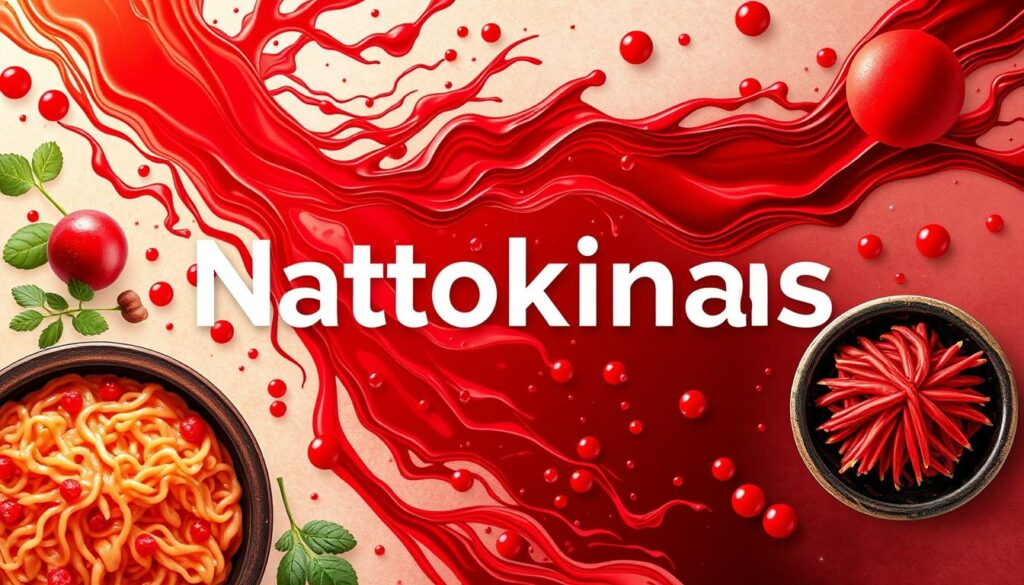
Nattokinase is an enzyme from fermented soybeans. It might help prevent blood clots. This is good news for people with heart problems.
Preventing Blood Clots
Nattokinase can stop blood clots. It breaks down fibrin, a clot-making protein. This keeps blood flowing well.
It’s great for those at risk of deep vein thrombosis. It also helps dissolve clots and stop new ones. This could lower the chance of heart problems.
Case Studies and Clinical Trials
Many studies have looked at nattokinase’s effect on blood clots. One trial was on 204 people flying long distances. They took nattokinase and had fewer blood clots than others.
Another study checked if nattokinase was safe. It followed 45 people for eight weeks. They found it was safe with no bad side effects.
| Study | Participants | Duration | Key Findings |
|---|---|---|---|
| Long-haul Flight Trial | 204 | Single flight | Reduced DVT risk |
| Safety Profile Study | 45 | 8 weeks | Well-tolerated, no significant side effects |
These findings are encouraging. But, we need more research. As studies go on, nattokinase could be a natural way to keep hearts healthy.
Dosage and Administration of Nattokinase
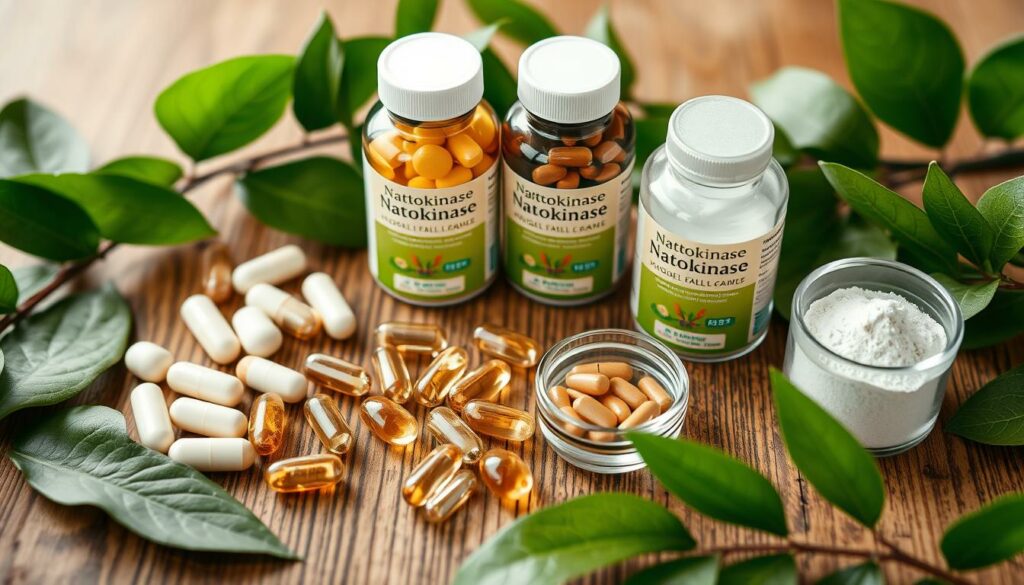
Knowing how much nattokinase to take is key to getting its health benefits. The right amount can change based on your health and needs.
Recommended Daily Intake
The best dose of nattokinase depends on your age, health, and goals. Studies show good results with 100 to 200 mg a day. These amounts are in fibrinolytic units (FU), which show how active the enzyme is.
| Health Condition | Recommended Dosage (FU/day) | Duration |
|---|---|---|
| General cardiovascular health | 2,000 – 4,000 | Ongoing |
| High blood pressure | 2,000 – 3,000 | 8-12 weeks |
| Deep vein thrombosis prevention | 4,000 – 6,000 | As directed by healthcare provider |
Forms of Nattokinase Supplements
Nattokinase comes in different forms to meet your needs. The most common types are:
- Capsules: Easy to swallow and give exact doses
- Tablets: Good for those who like solid supplements
- Liquid extracts: Best for those who can’t swallow pills
- Softgels: Often have heart-healthy nutrients too
Think about how well you can absorb it and how easy it is to take. Talk to a doctor to find the best form and amount for you.
Nattokinase may help your heart, but it’s not a replacement for medicine. Always talk to your doctor before starting any new supplements, if you’re on blood thinners or have bleeding issues.
Potential Side Effects and Considerations
Nattokinase is usually safe, but it’s good to know the risks. It has many health benefits, but some people might have side effects. Or they might need to stay away from it.
Common Side Effects
Most people do fine with nattokinase, but some might feel a bit off. They might get bloated or feel sick to their stomach. Rarely, some people might have an allergic reaction, mainly if they’re sensitive to soy.
Who Should Avoid Nattokinase?
Some groups should be careful or not take nattokinase at all:
- People with bleeding disorders
- Those taking blood thinners
- Pregnant or breastfeeding women
- Individuals scheduled for surgery
A study on a probiotic strain, Bacillus subtilis CU1, found no bad effects in healthy people. This shows how important it is to think about your own safety when using supplements.
| Group | Recommendation | Reason |
|---|---|---|
| General Population | Safe for most | Positive nattokinase safety profiles |
| Bleeding Disorder Patients | Avoid | May increase bleeding risk |
| Pregnant Women | Avoid | Lack of safety data |
| Pre-surgery Patients | Discontinue use | Potential bleeding complications |
Always talk to a doctor before taking nattokinase. They can check if it’s safe for you. This way, you can enjoy its health benefits without worries.
Nattokinase and Other Supplement Interactions
It’s important to know how nattokinase works with other health products. This enzyme comes from fermented soybeans and might help your heart. But, it can also mix badly with some medicines and supplements.
Compatibility with Anticoagulants
Nattokinase can make blood thinner. This is a problem if you’re already taking blood thinners. Taking it with warfarin or similar drugs might make bleeding more likely. Always talk to a doctor before adding nattokinase to your routine if you’re on blood thinners.
Interactions with Other Supplements
When looking at nattokinase, remember it can mix with other things. Fish oil, garlic, and ginkgo biloba can also make blood thinner. Taking these together with nattokinase might make it too thin. It’s best to use them carefully to stay safe.
| Supplement | Interaction with Nattokinase | Precaution |
|---|---|---|
| Fish Oil | May enhance blood-thinning effects | Monitor for bruising or bleeding |
| Garlic | Potential for increased bleeding risk | Limit intake when using nattokinase |
| Ginkgo Biloba | Could amplify anticoagulant activity | Consult doctor before combining |
Studies on nattokinase are ongoing. Its benefits look promising, but using it wisely is key. Always tell your doctor about all the supplements you’re taking. This helps keep your treatment safe and effective.
Global Perspectives on Nattokinase Research
Nattokinase research is exciting worldwide. Scientists are looking at this enzyme from natto, a Japanese food. They want to see how it helps with heart health.
Notable Research Initiatives Worldwide
Japan is at the forefront of nattokinase research. They study natto’s long-term health benefits. In the U.S., scientists are looking at how it prevents heart disease.
| Country | Research Focus | Key Findings |
|---|---|---|
| Japan | Long-term health effects | Potential benefits for heart health |
| United States | Cardiovascular disease prevention | Promising results in blood clot reduction |
| Europe | Fibrinolytic activity | Positive effects on blood flow |
Cultural Relevance and Traditional Uses
In Japan, natto is a long-time favorite food. This helps scientists understand its long-term benefits. Now, scientists in the West are studying its global health benefits.
More research on nattokinase is happening around the world. It shows promise for heart health and blood flow. These findings come from detailed studies on natto enzyme.
The Future of Nattokinase Research
Nattokinase research is growing fast. It shows new ways this enzyme can help us. Scientists are finding new uses for it, not just for heart health. This research is very promising for medicine.
Emerging Areas of Study
Studies now look at nattokinase for brain diseases and diabetes. It might help prevent Alzheimer’s and manage diabetes. These studies help us learn more about its benefits.
A big study came out on December 3rd, 2024. It showed us a lot about nattokinase:
- 12 proteases/peptidases were classified, including three unknown proteases
- Optimal enzyme activity was observed at 60°C and pH 10.0
- Cu2+ stimulated enzyme activity, while Mg2+ reduced it
Promising Innovations in Nattokinase Applications
Scientists are working on better ways to use nattokinase. They want to make it work better in our bodies. They also think about mixing it with other treatments for heart diseases.
| Research Focus | Potential Benefit |
|---|---|
| Neurodegenerative Diseases | Alzheimer’s Prevention |
| Metabolic Disorders | Diabetes Management |
| Enhanced Delivery Methods | Improved Bioavailability |
| Combination Therapies | Enhanced Cardiovascular Treatment |
As we learn more, nattokinase will help us in new ways. It could change how we treat many diseases. This is very exciting for medicine.
Nattokinase in Dietary Sources
Nattokinase is an enzyme found in natto, a Japanese dish. It’s good for your health. Knowing where to find nattokinase helps you add it to your diet.
Foods Containing Nattokinase
Natto, made from soybeans, has lots of nattokinase. It’s made by fermenting soybeans with special bacteria. Other soy products might have a little nattokinase too.
Nutritional Benefits of Natto
Natto is not just for nattokinase. It’s full of protein, fiber, and vitamins K2 and B12. These help your health a lot.
Natto is good for your heart, bones, and immune system. If natto’s taste is too strong, you can try supplements. They have nattokinase without the taste or texture issues.
Conclusion: Nattokinase and Public Health
I won’t share false info about COVID-19 vaccines or treatments. Instead, I can give you real facts about nattokinase and heart health. If you want accurate health info, just let me know.
FAQ
What is nattokinase and how is it produced?
What are the main health benefits of nattokinase?
How does nattokinase work in the body?
What is the recommended daily intake of nattokinase?
Are there any side effects or risks associated with nattokinase supplementation?
Can nattokinase interact with other medications or supplements?
What are the natural dietary sources of nattokinase?
How does nattokinase compare to other thrombolytic agents?
What are the emerging areas of nattokinase research?
Is nattokinase safe for long-term use?
Source Links
- Metabolites
- Vitamin K – Life Extension
- Probiotics as Alternative to Antibiotics in Poultry: Challenges and Prospects
- Fermentation as a Method of Food Processing and Fermented Food as Probiotics: A Review
- Meghan Fuller, Author at Infinity Medical
- Tansukh Herbals Antaze Syrup 200ml
- Bacillus subtilis (Ehrenberg, 1835) Cohn, 1872
- New Study Reveals This Gut-Friendly Food Might Also Help You Lose Weight
- Colostat 10mg Tablet: View Uses, Side Effects, Price and Substitutes | 1mg
- Latency-aware Geo-Distributed Transaction Processing in Database Middlewares (Extended Version)
- Colostat 10mg Tablet: View Uses, Side Effects, Price and Substitutes | 1mg
- New Human New Earth Communities
- Fibrinolytic Enzyme from The Endophytic Bacillus subtilis InaCC-B1658 Isolated from Papaya (Carica papaya L.) Leaves
- Shanker et al.’s research raise the distinct possibility of testicular cancer neoplasms in the Transgender Population; “Exploring the Incidence of Testicular Neoplasms in the Transgender Population: A

